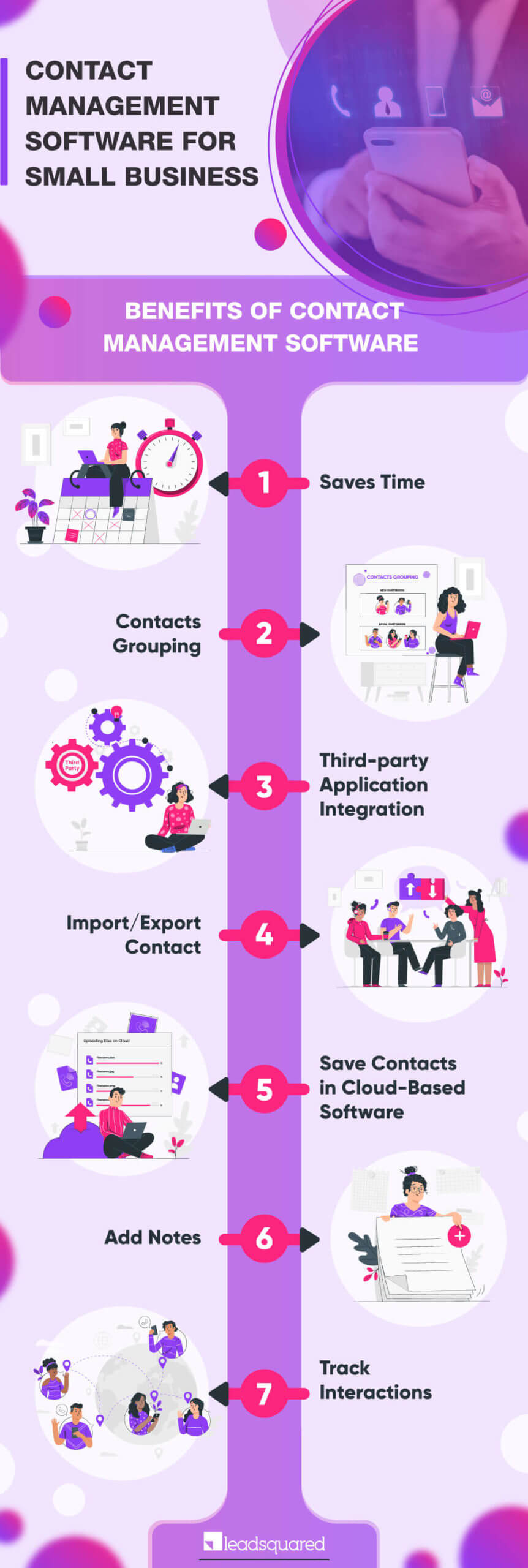This article explains how contact management software for small business helps improve the sales team’s productivity. It also illustrates how contact management systems help salespeople strengthen their relationships with customers by providing relevant information needed to strike a meaningful conversation with them.

Whether you are a small or a large organization, the need for managing contacts remains the same – the only difference is the scale and the tools of choice. For instance, small businesses generally rely on email inbox, smartphones, and spreadsheets to handle contact details, and enterprises use CRM tools for end-to-end customer contact management and more.
While it is okay for small teams to use spreadsheets, they need dynamic systems if they want to scale and cut down the redundancies from their day-to-day work. Hence, the need for efficient tools for end-to-end contact management.
In general, contact management software allows you to store, organize, and access customer, prospect, and vendor contact information. Businesses can easily store data such as addresses, associated companies, orders, and sales history. Think of it as a resource that can improve your sales productivity by making contact information available at your fingertips.
Let us talk about this in detail.
What is the purpose of the contact management system?
As your business grows, the number of your business contacts also grows. After reaching a certain scale, it becomes hard to manage them through traditional record-keeping ways. Therefore, managing contacts via email inbox, smartphone, or excel sheets is not the most efficient way. Also, with several contact details in your spreadsheet, identifying the ones that need to be contacted first and tracking their history becomes a cumbersome process.
For a growing business, managing contact information is indispensable. Now, this is where contact management software helps. It offers a simple, effective way to organize and manage contacts.
In the subsequent sections, we will discuss the benefits of contact management software for small businesses. We will also discuss how contact management software has evolved as a feature of CRM (customer relationship management) software that enables organizations to track the entire customer journey, manage interactions, and not just maintain a sophisticated database of customer information. So, let us dive in!
What is Contact Management Software?
Contact management software lets you store, organize, and access the contact information easily. It also allows you to maintain a history of all previous conversations. Using the software, you can also link or archive the details about a particular contact, which you can retrieve later, whenever required.

How Contact Management Software for Small Business Helps?
It is simple. You need not shuffle between email inbox and contact list for retrieving all the details you need to have a meaningful conversation. Through contact management software, you can view everything in one location. Moreover, it helps you to search for contacts using any information about them.
Earlier, salespeople and customer support representatives used to juggle between emails, internal phone calls, and more to find details of a customer. It not only hampered the productivity of the reps but also created disparities in the information. People often wasted time in finding the required information and kept a contact waiting for their query resolution.
Contact management software solutions resolved these issues to a great extent. It allows your teams to collaborate – hence, everyone is on the same page. It has also eliminated the information disparity, as everyone is now accessing the updated and latest details about a contact. The software also cuts down your response time, since not only are you notified of new leads, but can also initiate automated communication, before you actually connect with them.
Benefits of Contact Management Software
1. Saves Time with Automation
First and foremost, contact management software for small businesses helps in saving time. Sales reps or agents must always find the right customer information before making follow-up calls, including their older interactions with other team members.
The contact management software provides options to search or filter contacts through location, name, and other detail. Thus, allowing you to identify the contact details quickly.
Another time-saving aspect of contact management software is automation. It actively notifies sales reps of new leads or a sales-centric action. This way, salespeople can work proactively instead of reactively.
Many new-age contact management systems integrate with telephony dialers and cloud calling software. It allows reps and agents to dial a contact from the portal itself.
2. Contacts Grouping
Contact management software also helps small businesses to group contacts into different categories. You can group contacts into new customers, loyal customers, and returning customer categories. Moreover, you can also categorize contacts based on past customer data. Doing this will help your business understand customer preferences and purchasing behavior.
When grouping contacts, you can also plan different sales strategies for different kinds of customers and prospects. For instance, you can send regular discounts for a group that buys more frequently. Whereas for a group of new prospects, you can send promotional offers.
3. Third-party Application Integration
Contact management software integrates very easily with several third-party applications. For instance, the software can integrate with applications like Slack and Gmail.
Therefore, allowing you to pull the contact data easily from these applications. Since the software does the contact pulling, it will also save you a lot of manual work. It also eliminates the chances of human errors in terms of information, mistyped numbers, to name some.
4. Import/Export Contact
Contact management software provides you the ability to import and export contacts. You can quickly import contacts from locations like Google Contacts and spreadsheets. Moreover, you can also export contacts in various file formats. It is especially required when you want to share follow-up reports with your manager or client.
For instance, contact management is one of the integral features of LeadSquared CRM software. It allows you to import or export contact details, interaction history, comments, or notes in excel, CSV, and pdf formats. Sales reps can also export required details for reporting purposes. If you see, bulk import and export saves you a lot of time. This way, you can focus more on other important tasks to grow your business.
5. Save Contacts in Cloud-Based Software
Nowadays, businesses prefer cloud-based software over their on-premise counterparts for mobility and remote accessibility reasons.
Cloud-based contact managers safely store details like name, address, email id, phone number, call logs, and interaction history, and allow their access only to authorized people.
Since it is cloud-based, team members can view and edit contact information without necessarily being at their office premises. Any authorized person with an internet connection can access, add, and update the contact details. Thus, ensuring that sales and other teams have all the necessary data at their disposal. It is quite helpful for a distributed workforce. Moreover, cloud software vendors employ additional security measures to protect their client data – eliminating the possibility of data loss and breaches.
6. Add Notes
For reference, you can also add notes to the contact for other team members for future reference. This activity brings all the team members on the same page.
The facility to add notes also ensures that contact does not receive repeated calls from different sales reps for the same query. All these factors count a lot when you aim at delivering superior customer experiences.
7. Track Interactions
Businesses often track relevant activities of their customers (with their consent). Information on interaction with sales reps, products bought, and challenges faced can help a lot. You can combine this data and create a unified view of customer preferences, brand sentiments, and more. It eventually helps in increasing sales and results in higher revenue for the organization. These factors make it crucial to use contact management software for small businesses.
What is Best for Your Business? Contact Management Software or CRM Software?
Today, both large and small organizations want to track the entire customer journey and leverage individual touchpoints to influence buyers. While this may not be possible with traditional contact managers, CRM software is best to track every interaction with contacts – from the time of lead capture to the time they become a customer and beyond.
What used to be a contact management system earlier has become a feature of CRM software. Since you can achieve a lot more such as sales and marketing automation, lead management, and opportunity management, it is wise to look for a CRM solution that serves all the benefits of a contact management system.
Final Thoughts
In today’s competitive business environment, even a single lost opportunity is a huge loss. Therefore, businesses should take every possible measure to avoid such losses. Still, 40% of salespeople use email programs and spreadsheets for storing customer data. It is frightening for the growth of your business.
There are several ways in which contact management software serves small businesses. For instance, a well-organized contact list with interaction history will improve the efficiency of your team. Thus, you can achieve performance that exceeds expectations.
So, invest in contact management or CRM software that boosts the productivity of your team. It will bring your business better returns on investment.
As a small business, you can manage details easily when you only have a handful of leads. But what when your business grows? You could not derive meaningful insights from the data, right? So, you will need a software solution for accurate customer insights – regardless of the size of your business.
If you are looking for a solution that can streamline your contact management activities from start to end, you must try LeadSquared CRM software. It not only stores, organizes, and makes contacts accessible on your fingertips but also tracks interactions, automates communication, and seamlessly integrates with several third-party apps to make communication with your customers hassle-free. Explore what more LeadSquared CRM can do for you that can accelerate your growth. Try it Free!








